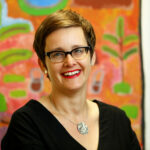When I was doing my PhD research in Germany, the WZB – a social science research institute in Berlin – had a family room dedicated for after-hours childcare with an educator. While I was taking evening seminars, my kids would run up and down the hallway with their little buggy cars.
But my experience in Australia has been vastly different.
Like many women, my time as an early-career academic coincided with my childbearing years, and I encountered all sorts of barriers put up by norms and practices that couldn’t imagine a way to combine PhD research with caring for children.
Having a child is often referred to as a “research career break” in the higher education sector. But the most common age for childbearing (between 30 and 34) also happens to align – almost perfectly – with the most common age to get a four-year PhD (32 to 36). It is not a break – it means becoming a parent when your career is starting, but if you want to be taken seriously, academic culture expects you to give your undivided attention to your research.
My first child was four months old when I started my PhD. Before the birth I was teaching at a university in Australia – on a casual contract with no access to paid parental leave. It meant that my scholarship and casual teaching income were mostly used to cover childcare costs.
This is a common story – the money available for early-career young mothers simply doesn’t stretch far enough. The average scholarship for PhD students is around $35,000 – for a single parent with one child, this only just scrapes in above the relevant poverty line at $34,751.
It’s not any easier for undergraduate students. Western Sydney University researchers studied student mothers at WSU – mostly undergraduates – and identified a range of barriers they encountered. These included inconsistent support from lecturers, people making assumptions about what they can or cannot manage with a kid, tutorials that start at 5pm when childcare centres are closed; a lot of red tape to get extensions or special considerations even when it’s warranted; feeling socially isolated from other students without kids; and being torn between the need to study, care, and earn money.
So, what must change? Free campus childcare in all workplaces is critical. Only three Australian universities currently offer childcare at all their worksites. In many places, staff and students miss out on childcare places because demand frequently exceeds supply, waitlists are long, and there are insufficient (or no) places reserved for staff and students.
Increased financial support is also needed to close the gender pay gap. The government’s move to increase assistance to single parents by extending the cut-off age for the single parenting payment is a step in the right direction – as are recent increases to paid parental leave entitlements – but we can do more to support working parents.
I know firsthand that education can change lives – in fact, I attribute much of my career success to the learnings from my PhD. Education and training are the foundation that allows us participate meaningfully, and equitably, in employment. But the latest ABS data shows that the main barrier for more than half of Australian women who are seeking employment continues to be the demands of caring for children.
We need to do better for mothers and parents seeking education and training. Investments in childcare will increase the number of parents returning to the workforce – this is the best gift we could give women this Mother’s Day.
- Please note: Picture at top is a stock photo
Dr Janin Bredehoeft has worked as an economist and for the Workplace Gender Equality Agency. She now heads up Science in Australia Gender Equity (SAGE), which delivers Australia’s only transformational gender equity, diversity and inclusion program for the higher education sector.





